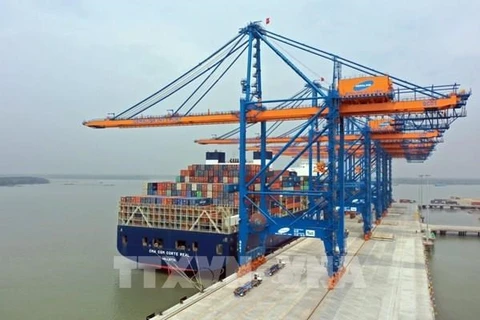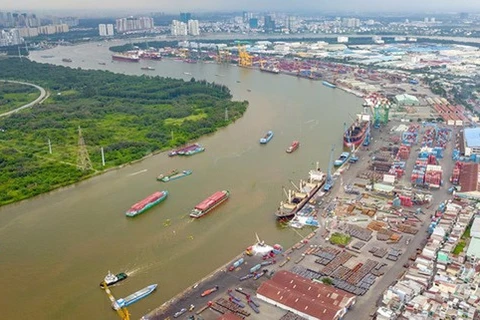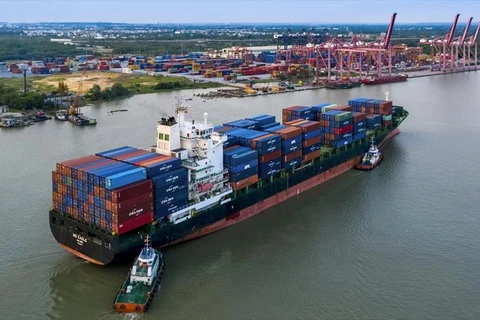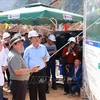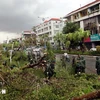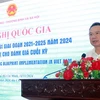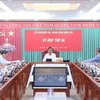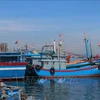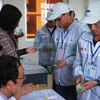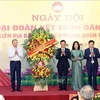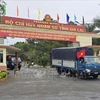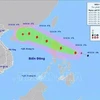HCM City (VNS/VNA) - Minister of Transport Nguyen Van Thang said Vietnam should increase the proportion of maritime and inland waterway transport to at least 50% in order to reduce logistics costs and road accidents in the coming time.
Thang made the statement at a dialogue conference for businesses in the field of maritime and inland transport organised by the Ministry of Transport in Ho Chi Minh City on March 22.
“The country has advantages in terms of coastline, seaport system, and inland waterways but we have not exploited these advantages,” he said.
The conference is expected to help ministries and localities to research and find practical solutions to take advantage of strengths such as the country’s long coastline, diverse port system, and rich inland waterways system.
Currently, road transport accounts for 80% of goods transported and nearly 100% of passengers.
The road infrastructure still has many shortcomings, while the waterway and maritime systems are very good in all regions.
The Ministry of Transport wants to receive more comments on maritime transport development in order to propose policies to encourage businesses to invest and develop.
Vietnam has the advantages of a long coastline, is close to international maritime routes, and has a dense river system.
The maritime and inland waterway industry plays an important role in the country’s transportation sector in particular and economy in general. This is a low-cost mode of transport, capable of transporting goods in large quantities, that are over-sized and overweight over long distances.
The majority of the country's import and export goods are transported by sea. The country's seaport system has received the world's largest container ships, and 40 major shipping lines in the world operate in Vietnam.
The country now has three ports in the list of the 50 container ports with the largest throughput in the world.
Tran Bao Ngoc, Director of the Transport Department under the Ministry of Transport, said the Vietnamese fleet of ships has developed rapidly recently.
Total tonnage increased by 42% over the past six years, from 7.6 million DWT to 10.7 million DWT.
The country’s shipping fleet accounts for 100% of domestic output and 6-8% of the import-export transport market share.
However, there remains a high proportion of general and small tonnage ships, while the world trend is increasingly using large container ships.
Vu Thanh Hai, Chairman of the Board of Directors of Hai An Transport and Stevedoring Joint Stock Company, said the country has 1,015 water transport ships but very few container ships.
To maintain the development of the Vietnamese fleet, units need to have more new fleets in accordance with practical needs, in which priority should be given to developing ships with a capacity of 1,700 TEU.
However, the difficulty of developing a fleet today is that the cost of investing in ships is too high, especially container ships. Loan interest rates at banks are relatively high and the cost of value-added tax (VAT) for importing ships is up to 10%.
Hai proposed that loan interest rates for businesses investing in developing container fleets should be lower while exemption or reduction of VAT on imported container ships and exemption of contractor taxes for businesses when renting or leasing containers is also needed.
Tran Do Liem, Chairman of the Vietnam Inland Water Transport Association, said the proportion of professional water transport vehicles is not high.
Most private companies only have two or three barges, which is not competitive enough on the market. Therefore, it is necessary to supplement the list of vehicles and offer preferential credit for businesses investing in ships and vehicles, he said.
Many delegates agreed that the unpredictable market developments, political instabilities, prolonged trade conflicts and climate change has caused difficulties and challenges for the transportation industry, affecting the operations of businesses engaged in producing, trading, and distributing goods.
Therefore, updating and supplementing new mechanisms and policies in this field is very necessary to better support maritime and inland waterway businesses, they said.
The Ministry of Transport will direct affiliated units to perform a number of tasks to facilitate operations of the businesses in this field.
This aims to effectively exploit domestic maritime transport to help reduce pressure on road transport and transport costs, and reasonably regulate the market share of various types of transport.
In addition, it helps maximise the advantages of seaports, especially international gateway ports, to attract large ships transporting import and export goods on long-distance shipping routes./.
Thang made the statement at a dialogue conference for businesses in the field of maritime and inland transport organised by the Ministry of Transport in Ho Chi Minh City on March 22.
“The country has advantages in terms of coastline, seaport system, and inland waterways but we have not exploited these advantages,” he said.
The conference is expected to help ministries and localities to research and find practical solutions to take advantage of strengths such as the country’s long coastline, diverse port system, and rich inland waterways system.
Currently, road transport accounts for 80% of goods transported and nearly 100% of passengers.
The road infrastructure still has many shortcomings, while the waterway and maritime systems are very good in all regions.
The Ministry of Transport wants to receive more comments on maritime transport development in order to propose policies to encourage businesses to invest and develop.
Vietnam has the advantages of a long coastline, is close to international maritime routes, and has a dense river system.
The maritime and inland waterway industry plays an important role in the country’s transportation sector in particular and economy in general. This is a low-cost mode of transport, capable of transporting goods in large quantities, that are over-sized and overweight over long distances.
The majority of the country's import and export goods are transported by sea. The country's seaport system has received the world's largest container ships, and 40 major shipping lines in the world operate in Vietnam.
The country now has three ports in the list of the 50 container ports with the largest throughput in the world.
Tran Bao Ngoc, Director of the Transport Department under the Ministry of Transport, said the Vietnamese fleet of ships has developed rapidly recently.
Total tonnage increased by 42% over the past six years, from 7.6 million DWT to 10.7 million DWT.
The country’s shipping fleet accounts for 100% of domestic output and 6-8% of the import-export transport market share.
However, there remains a high proportion of general and small tonnage ships, while the world trend is increasingly using large container ships.
Vu Thanh Hai, Chairman of the Board of Directors of Hai An Transport and Stevedoring Joint Stock Company, said the country has 1,015 water transport ships but very few container ships.
To maintain the development of the Vietnamese fleet, units need to have more new fleets in accordance with practical needs, in which priority should be given to developing ships with a capacity of 1,700 TEU.
However, the difficulty of developing a fleet today is that the cost of investing in ships is too high, especially container ships. Loan interest rates at banks are relatively high and the cost of value-added tax (VAT) for importing ships is up to 10%.
Hai proposed that loan interest rates for businesses investing in developing container fleets should be lower while exemption or reduction of VAT on imported container ships and exemption of contractor taxes for businesses when renting or leasing containers is also needed.
Tran Do Liem, Chairman of the Vietnam Inland Water Transport Association, said the proportion of professional water transport vehicles is not high.
Most private companies only have two or three barges, which is not competitive enough on the market. Therefore, it is necessary to supplement the list of vehicles and offer preferential credit for businesses investing in ships and vehicles, he said.
Many delegates agreed that the unpredictable market developments, political instabilities, prolonged trade conflicts and climate change has caused difficulties and challenges for the transportation industry, affecting the operations of businesses engaged in producing, trading, and distributing goods.
Therefore, updating and supplementing new mechanisms and policies in this field is very necessary to better support maritime and inland waterway businesses, they said.
The Ministry of Transport will direct affiliated units to perform a number of tasks to facilitate operations of the businesses in this field.
This aims to effectively exploit domestic maritime transport to help reduce pressure on road transport and transport costs, and reasonably regulate the market share of various types of transport.
In addition, it helps maximise the advantages of seaports, especially international gateway ports, to attract large ships transporting import and export goods on long-distance shipping routes./.
VNA

